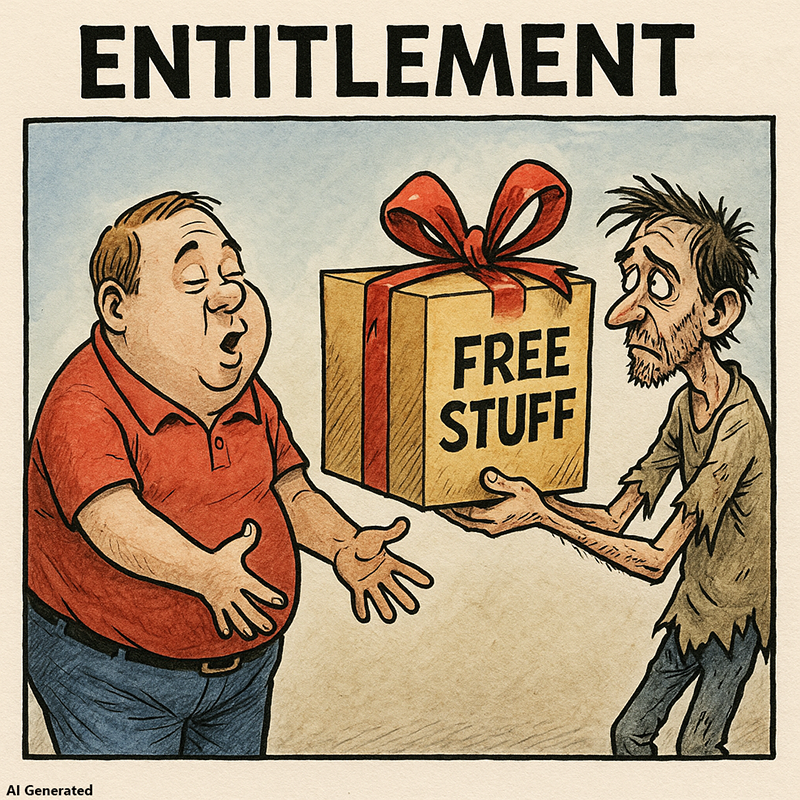
Modified from a reflection written in January 2009.
Entitlement is believing you are owed what you have not earned. Social Security is not an entitlement, but an earned benefit based on years of employment and contributions: A contract between citizens and the United States of America. We see workers of all kinds, at every level, from entry-level clerical workers to state and national political leaders who suffer from the notion that they are entitled to employment, to reward, to a benefit of some kind because they have sacrificed or labored diligently or paid their dues. They believe this payment of dues entitles them to a privilege. The most grievous result of entitlement is a lack of personal responsibility. Locus of control disappears; blame is placed on others and someone else should fix everything. This sounds bleak.
Elected officials might believe they have served the people well and have earned the right to something that benefits them personally. Maybe, but probably not. Students who have paid tuition believe they are owed a good grade. When we expect life to go our way without effort, we may struggle to cope with failure, criticism or hardship, which can lead to emotional fragility and learned helplessness. Who wins? Nobody.
Entitlement is to opportunity; what arrogance is to talent. In both cases, the former dilutes the latter until a society, a subgroup or an individual begins to believe just showing up ensures reward. Reduced motivation and work ethic follow. If someone expects success without effort, they’re less likely to put in the necessary work to achieve it. Stagnation and underachievement follow. This does not lead to healthy individuals or a healthy community.
Commencements mark the exercise of opportunity through the attainment of goals. If students feel entitled to good grades or advancement without effort, they will expect high marks simply for showing up rather than demonstrating mastery or they will resist challenges because they assume they should not have to struggle. Some days, thankfully not many at WT, I fear commencement is anticipated as a foregone conclusion, the price has been paid, and the gold ring is waiting—an unfair, misplaced assumption.
Without the possibility of failure, success is a cheap thing. Is it even success? Entitlement steals opportunity and quality with it. More vexing yet, it might create social division and resentment. A culture of entitlement can fuel envy and resentment between groups. No organization can sustain itself with opposing perspectives, from a family to a nation. It would be a house divided.
I remember a faculty member coming to my office when I was a dean to voice concerns about not receiving tenure and promotion after years of teaching, contributing to the body of knowledge through research and publication, and serving the professional and extended community. He was upset about the process’s results. Every committee and individual along the way viewed his work similarly; it was not up to the university’s standards.
“I work hard, come to the office, teach my classes and publish papers…I deserve to be promoted and tenured,” he said. I told him, “What you are given is a job to do, a paycheck every month, health insurance, a good office in which to work, students to teach, staff support, but you have to earn tenure from your peers, and tenure is not an entitlement and not guaranteed.” He was angry with me for my forthrightness. I understood. Entitlement did not work in Tammany Hall and should not work in the academic halls of public universities. It is antithetical to the purpose of a challenging intellectual environment. It places people in positions for which they are unqualified. Quality evaporates and purpose with it.
We see public officials and university leaders who believe their entitlement extends to actions and privileges not granted but grabbed. We are entitled to serve and, in service, earn respect. Alexis de Tocqueville, in Democracy in America, emphasized that liberty requires citizens to practice self-restraint, initiative and responsibility. He further cautioned that democracies risk slipping into “soft despotism” if citizens, and by extension elected leaders, expect the state to provide everything. In all education, but especially higher education, entitlement undermines the habits of effort and responsibility that sustain representative self-government.
In any organization, nothing undermines success more than the idea that people within the organization are entitled to something other than the opportunity to succeed or excel. Any substitute for results, whether a position, promotion, career guarantee or longevity, is an entitlement. It is a sickness.
At West Texas A&M University, we should see entitlement for what it is: a threat to our purpose. We aspire to strive for attainment, merit, excellence and the demonstration of quality in all that is carried out in every aspect of the enterprise.
Excellence is entitlement’s cure; nothing else works.
Walter V. Wendler is the President of West Texas A&M University. His weekly columns, with hyperlinks, are available at https://walterwendler.com/.




